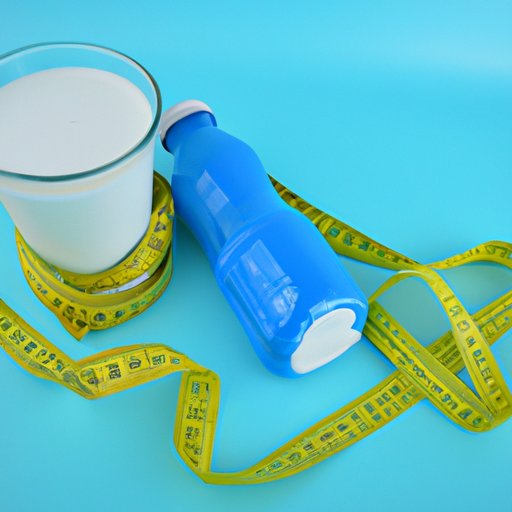
Introduction
The debate over whether or not milk is bad for your diet has been a point of controversy among health and fitness enthusiasts for years. While some argue that dairy products can hinder weight loss efforts, others maintain that milk is an important part of a healthy and balanced diet.
In this article, we’ll delve into the truth about milk and weight loss, debunk common myths, and examine the actual nutritional content of milk. We’ll also explore the risks of cutting out milk completely and examine studies on the relationship between milk consumption and weight loss or gain. Most importantly, we’ll provide practical tips for incorporating milk into your diet in a way that supports your health and fitness goals.
The Truth about Milk and Your Diet: Debunking Common Myths
There are many myths surrounding milk and weight loss that persist despite evidence to the contrary. For example, some people believe that milk is high in fat and calories, and therefore should be avoided when trying to lose weight. However, the reality is that many types of milk, including skim and low-fat varieties, are actually quite low in fat and calories.
Another common misconception is that drinking milk leads to an increase in body fat. However, studies have shown that there is no direct link between milk consumption and weight gain. Furthermore, milk contains a number of important nutrients that are beneficial for overall health.
Why Removing Milk from Your Diet may Actually Harm Weight Loss Efforts
While some people may believe that cutting out milk will help them lose weight more quickly, the reality is that eliminating milk from your diet can actually lead to nutrient deficiencies. Milk is an excellent source of calcium and Vitamin D, both of which are essential for strong bones and teeth. Without these nutrients, you may be more prone to fractures and other bone-related health issues.
Furthermore, studies have shown that calcium and Vitamin D also play a critical role in weight loss and management. Individuals with a calcium deficiency may experience slower metabolism and greater resistance to weight loss. By including milk in your diet, you can help ensure that you are getting the nutrients you need to support weight loss and enjoy optimal health.
The Benefits and Drawbacks of Incorporating Milk into a Balanced Diet
As with any food, there are both pros and cons to including milk in your daily diet. On the positive side, milk is an excellent source of protein, which can help you feel full and satisfied after a meal. Additionally, getting enough calcium and Vitamin D can help prevent bone loss and maintain overall bone health.
However, for some people, consuming milk can cause digestive issues or other adverse reactions. Additionally, some individuals are lactose intolerant and may need to avoid dairy products altogether.
If you are unable to consume milk due to lactose intolerance or other digestive issues, there are other dairy options that can provide similar nutritional benefits. For example, many people find that they are able to tolerate yogurt and other fermented dairy products.
Is Milk Really that Bad for Your Waistline? Experts Weigh In
There has been much debate over the years regarding the relationship between milk consumption and weight loss. While some studies have suggested that drinking milk can help support weight loss by promoting feelings of fullness and satiety, others have suggested that milk may hinder weight loss efforts due to its sugar and calorie content.
Overall, experts agree that the relationship between milk and weight loss is complex and can vary depending on a number of factors. In order to achieve weight loss, it is important to focus on consuming nutrient-dense foods in appropriate portions, rather than eliminating entire food groups such as dairy.
Understanding Milk’s Role in a Healthy Diet: Separating Fact from Fiction
The truth is that milk can be an incredibly nutritious part of a healthy and balanced diet. Milk is an excellent source of protein, calcium, and Vitamin D, all of which are essential for strong bones, healthy metabolism, and overall wellness.
Despite the many nutritional benefits of milk, there are some persistent myths regarding its fat and cholesterol content. Many people believe that milk is high in fat and unhealthy cholesterol, but the reality is that many types of milk are actually quite low in fat and contain healthy fats such as omega-3s.
Milk and Your Diet: Finding the Right Balance for Optimal Health and Fitness
When it comes to incorporating milk into your daily diet, it’s important to focus on balance and moderation. While there are many benefits to consuming milk, it should be consumed in appropriate portions as part of a well-rounded diet. Additionally, if you are lactose intolerant or otherwise unable to consume dairy products, there are other options available that can provide similar nutritional benefits.
To incorporate milk into your daily diet, try adding a glass of low-fat or skim milk to your breakfast or snack routine. Additionally, consider using milk as a base for smoothies or shakes, or adding it to cereal or oatmeal for an extra boost of calcium and Vitamin D.
Conclusion
When it comes to milk and weight loss, there are many myths and misconceptions that persist despite evidence to the contrary. The truth is that milk is an important part of a healthy and balanced diet, providing valuable nutrients that support overall health and wellness. By incorporating milk into your diet in appropriate portions and focusing on nutrient-dense foods, you can enjoy the benefits of this nutritious beverage while reaching your weight loss and fitness goals.




